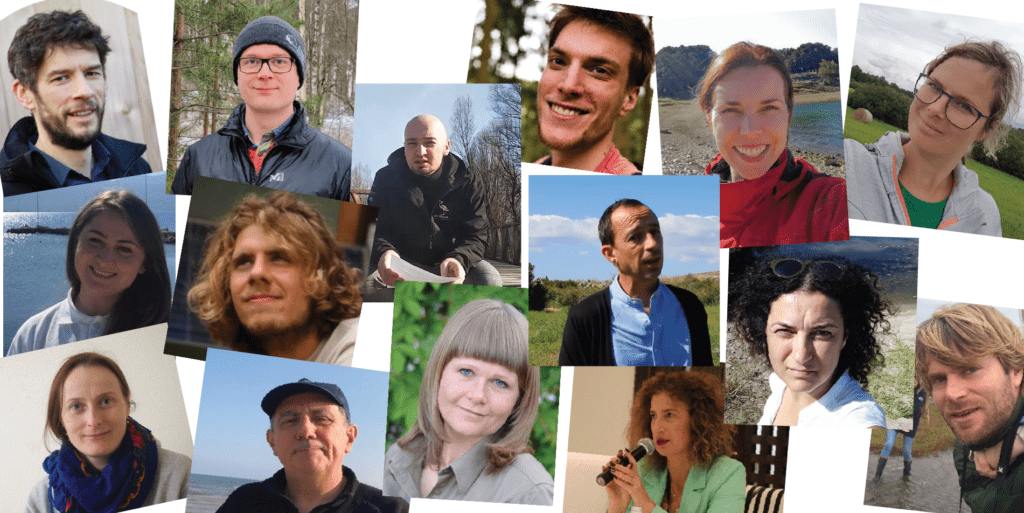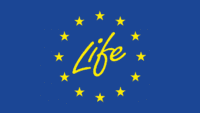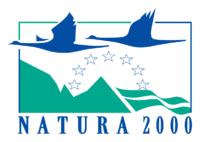LIFE e-Natura2000.edu: Supporting e-learning and capacity building for Natura 2000 Managers
- Duration: 2018-2021
This innovative three-year project explored the potential of building new approaches and learning methods to improve knowledge and capacity amongst Natura 2000 Managers in both public and private land, across the EU. Taking a competence-based approach, it enabled peers to connect and learn about what managers need to know and be able to do.
The project analysed training needs and made available new ways of accessing information about the multiple skills required for Natura 2000 management and policy implementation.
New learning tools and methods to build capacity & develop competencies
The project examined the competencies required by a range of actors to manage Natura 2000 more effectively. To do this, the project tested a mix of innovative tools, e-learning methods and approaches to delivering capacity building.
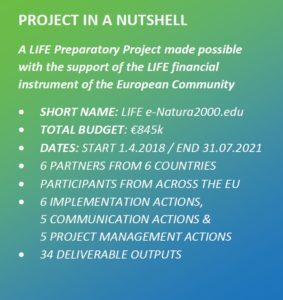
A cohort of 60 participants formed the project’s ‘core group’ of participants: this was complemented and extended by a further target group of 500 ‘casual’ users of the project’s competence development materials. The participants were drawn from the full spectrum of managers working with and involved in the implementation of Natura 2000. In this way, the project proactively engaged a representative range of Natura 2000 managers across the EU – site-based staff, private landowners, protected area staff, rangers etc.
With the focus on developing a flexible mix of blended learning tools and methods which are designed to build capacity and develop competencies required, the project aimed to reach the widest possible audience – site based Natura 2000 practitioners, whether managers, specialist staff such as communication and interpretation officers or ecologists, as well as people directly involved with management planning and Natura 2000 policy implementation. We actively looked to engage a broad spectrum of individual Natura 2000 site managers, Rangers and private landowners interested and motivated to learn more about Natura 2000, what it is, why it matters and how to improve management practices.
Three learning modules were developed to cover three selected priority competence areas to provide access to the knowledge and skills required to manage Natura 2000. The project modules covered competencies identified as being required for Natura 2000 managers, in areas such as Natura 2000 policy and planning, biodiversity conservation, awareness and education, communication and collaboration and community-based engagement.
By means of workshops, webinars, interactive online learning materials, video demonstrations, case studies and a new web-based ‘hub’, the project increased access to a range of information and enable experience exchange – sharing your experience matters, especially for Natura 2000 managers, so be involved and start e-learning!
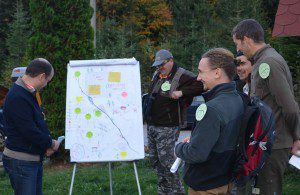
Capacity Building in Europe – Ranger training in Romania © ProPark Foundation for Protected Areas
In 2020, LIFE.edu ran three courses developed to advance the specific skills, knowledge and attitudes required by Natura 2000 managers and protected area professionals.
In March 2020, 60 individuals with responsibilities for Natura 2000 management joined the online training in English, Spanish and Romanian.
Project participants worked together in a mix of face-to-face workshops and an online summer school and used a range of online and digital tools, such as webinars, demonstration videos and a new smartphone app to support networking.
Learn more about the courses:
- Course I: Applied Conservation Biology
- Course II: Building alliances for Natura 2000 management
- Course III: Competent Inclusive Communication
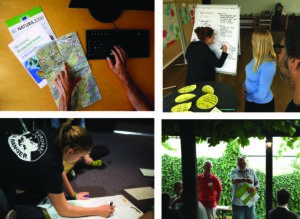
Download the eNatura2000 app!
The eNatura2000 App has been designed within the project to enable Natura 2000 site managers and private landowners to connect, discuss and learn in an innovative way. The management of Natura 2000 lands requires specific, constantly evolving capacities, and presents unique challenges that professionals need to address on a daily basis.
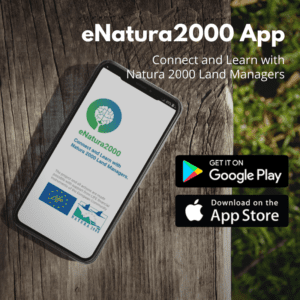
The app is available on Google Play and App Store!
With eNatura2000, users will be able to discuss issues and difficulties that arise in the management of Natura 2000 lands, and get inspired by existing best practices and solutions. Developed by EUROPARC with 5 partner organisations from around Europe, this practical tool will make networking across regions, countries, and land types for Natura2000 managers easy and enjoyable.
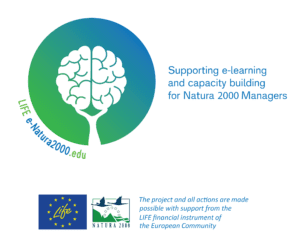
Partners
The project was led by the EUROPARC Federation with the support of six partners:
- ProPark,
- FUNGOBE / EUROPARC Spain,
- TESAF Department of the University of Padova,
- European Landowners Organisation,
- Kullaberg Nature Reserve.

Competencies for management of Natura 2000 – Report
Covering over 18% of the EU’s land area and more than 7% of its marine territory, the Natura 2000 network is the largest coordinated network of protected areas in the world: the network includes the most valuable and threatened species and habitats of Europe. Although considerable progress has been made in the implementation of the measures legally required by the Nature Directives, ensuring effective management of individual Natura 2000 sites remains a challenge in most EU countries. In particular, deficiencies in practical implementation and inconsistencies of approach are widely recognised as adversely impacting on the practice and quality of Natura 2000 site management.
What are the core competence needs of Natura 2000 and Protected Area managers? How can we build practical capacities and know-how through innovative methods? Within the LIFE e-Natura2000.edu project, EUROPARC and its partners delivered 3 blended-learning opportunities for Natura 2000 & Protected Area Managers in 2020.
The challenge of effective Natura 2000 management
The outcome of the Fitness Check of the Birds and Habitats Directives made clear that they are ‘fit for purpose’ and demonstrate EU added value. The Directives have generated many important benefits for nature conservation and sustainable development overall. They provide a balanced and workable framework for addressing the varying interests of stakeholders while respecting nature conservation objectives. Overall the costs of implementation are reasonable and outweighed by the benefits, although they do impact some stakeholders more than others.
However, the evaluation also reveals problems with the pace and extent of progress that stem from implementation. While some problems have decreased over time as a result of experience, others require future action. From the perspective of improving Natura 2000 management in practice, implementation improvements are required in such areas as:
- management planning,
- provision of more and better information,
- increased guidance, more integration and joined-up delivery with other policies,
- increased awareness and involvement of stakeholders.
The evaluation study highlights that Natura 2000 sites do not exist in isolation: not only are they part of an ecological network which spans the EU, each site has different human and economic contexts that must be included in nature conservation decision-making. Therefore, not only do Natura 2000 managers need to know how to assess the condition of their site(s) and put in place the measures necessary to achieve conservation objectives, but they also need to know their stakeholders and how to work with them to achieve those objectives.
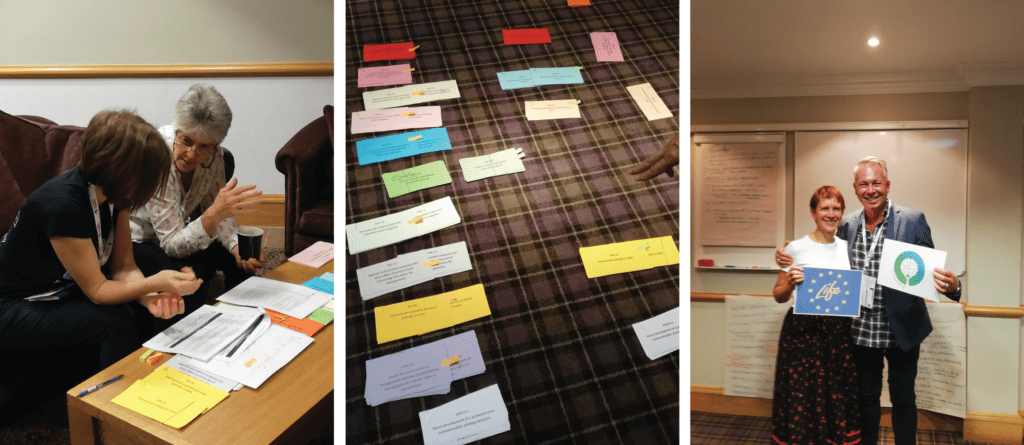
Capacity Building workshop at EUROPARC Conference 2018, Scotland
There is a clear need to build capacity amongst Natura 2000 site managers in relation to, for example, the development of technical knowledge along with ways to ensure effective stakeholder engagement: the implementation of necessary site conservation measures, including the development and implementation of management plans, is after all fundamentally a participatory process which requires skilful working with nature and people at the same time.
How can we respond to that?
With the LIFE Preparatory project: ”Supporting e-learning and capacity building for Natura 2000 managers”, a three-year project that explored the potential of new approaches and methods to improve specific competencies and build practical capacity required by Natura 2000 site managers across the EU. The project aimed is to strengthen the implementation of Natura 2000 and contribute to the successful realisation of the EC’s Action Plan for People, Nature and the Economy.
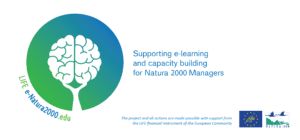
This LIFE Preparatory project aimed to contribute to closing the gaps between the ‘what’ and ‘how’ of Natura 2000 management. The project focused on building practical capacities and know-how across a set of core competence areas identified as being fundamental to the work of Natura 2000 site managers from diverse backgrounds and operational contexts. The results from Action A1 form the ‘backbone’ of the project to be further developed across the other project actions.
1) Identification and assessment of competencies for management of Natura 2000
As part of Action A1, “Identification and assessment of competencies for management of Natura 2000”, a first technical meeting was held in Brussels. The project team and invited experts analysed the IUCN Global Register of Competencies for Protected Area Practitioners. The main objective was to identify a set of priority competencies specifically required by Natura 2000 site managers and for which the project will develop a set of innovative learning tools.
Download the Report: Identification and assessment of competencies for management of Natura 2000
This report summarizes the results of project Action A.1 and the contents represent the result of collective inputs from all project partners and external experts invited to the first technical workshop of the project. It provides:
1) an analysis of functions required to be performed by site managers for the efficient implementation of Natura 2000, based on the results of the Fitness Check of the Nature Directives (2016) and on the Nature Directives’ legal requirements;
2) a methodological framework for the development of a coherent, competence-based approach to capacity building for Natura 2000 site management;
3) a defined list of key competencies identified as being particularly relevant for Natura 2000 site managers across Europe – these lie in the fields of:
- Communication and collaboration, including the development of strong, inclusive participatory processes recognising the vital role of local communities and respect for cultures;
- Awareness and Education, including working with local communities and cultures;
- Natura 2000 policy, planning and projects focused on biodiversity conservation practices.

Summary of technical activities and functional areas of expertise required by Natura 2000 site managers
2) Understanding Natura 2000 implementation in different EU Member States
The Nature Directives require all Member States to provide the capacity necessary to secure a positive impact for Natura 2000 and establish a framework for effective implementation based on competent management practices. However, management of Natura 2000 sites is organised and approached differently by each Member State: in many countries, Natura 2000 sites are managed by governmental institutions acting at different levels of territorial responsibility; in other countries, management responsibilities for Natura 2000 are devolved or delegated to various entities. This diversity means that capacity needs to fulfill the specific management responsibilities for Natura 2000 are highly variable across the EU.
Below you can have an idea of how Natura 2000 is being managed in the countries of the project partners:
Natura 2000 Management in Austria
Natura 2000 Management in Croatia
Natura 2000 Management in Italy
Natura 2000 Management in the Netherlands
Natura 2000 Management in Romania
Natura 2000 Management in Spain
Natura 2000 Management in Sweden
3) Build a competence-based approach
In the IUCN ‘Global Register of Competencies for Protected Area Practitioners’, there are 15 competence categories, each of which covers specific skill and knowledge requirements to indicate what a Protected Area practitioner should know and be able to do.
Competence derives from the combination of knowledge, skills and attitude (K-S-A). A competent individual can clearly demonstrate that he/she has knowledge on the theoretical and technical aspects of a specific task, is able to perform that task reliably and consistently and complete it conscientiously. Competence-based approaches to capacity building are based around proven acquisition of the skills, knowledge and attitude needed for effective implementation of tasks and functions.
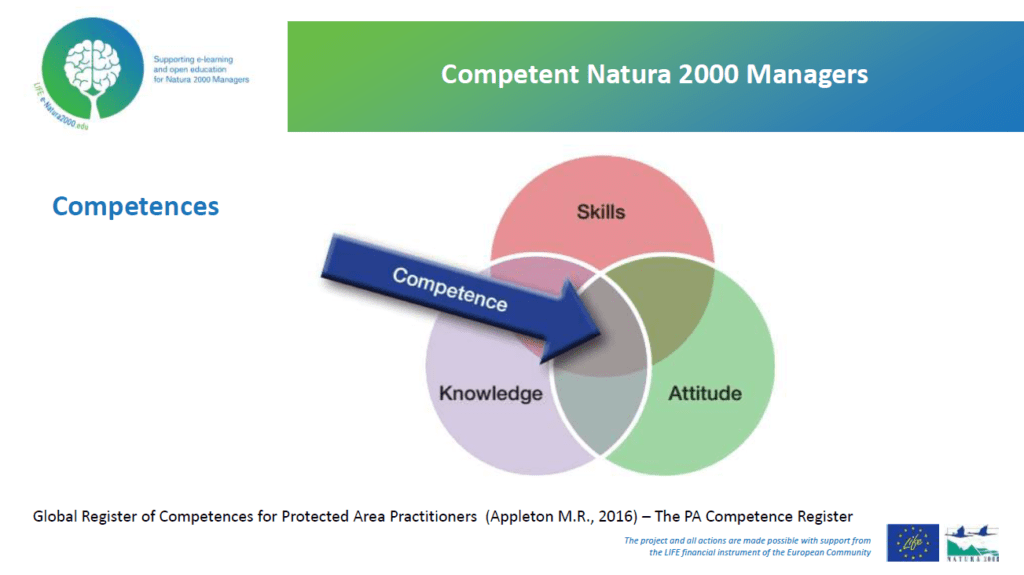
Competence is at the crossroads between Knowledge, Skills and Attitude.
Within the context of this LIFE Preparatory project, the competence-based approach to capacity building refers to providing learning opportunities that enable Natura 2000 site managers to develop or acquire the skills, knowledge and attitude needed to effectively perform tasks required of them by the Nature Directives. As for Protected Area practitioners, competencies (required or desired) by Natura 2000 site managers vary by staff levels and operating contexts. As explained in the report above, the competence needs are correlated with:
- the complexity of a given Natura 2000 site;
- its management objectives and implementation activities;
- the overall context, the type of management setting and governance arrangements;
- the specific responsibilities of involved organisations; and, available resources.
These are some of the multiple factors which need to be considered when identifying the competencies required by individual Natura 2000 site managers and when designing approaches to capacity building.
4) Building Capacity
The project Partners delivered 3 core competence Modules in 2020, which focused on:
- Biodiversity conservation: policy, planning & projects for Natura 2000 (led by ProPark) ;
- Effective communication & collaboration for Natura 2000: engaging local communities & working with cultures (Led by FUNGOBE);
- Powerful communication for Natura 2000 managers (Led by EUROPARC)
![]()
Natura 2000 and Protected Areas
The relationship between Natura 2000 sites and Protected Areas varies across different Member States: in many countries, Protected Areas were formally established years before Natura 2000 sites were designated. Unlike Natura 2000 sites, Protected Areas are not designated legally by the EU: various country-specific, national or regional, legal protection mechanisms are applied for Protected Areas.
In some cases, Natura 2000 sites may lie within a Protected Area, but not always, and there may be different management arrangements and requirements. Probably reflecting the fact that Protected Areas generally precede Natura 2000 sites, dedicated teams are not always in place for Natura 2000 site management.
However, although the legal status of Natura 2000 sites is different from Protected Areas, there is clearly a significant overlap in terms of the primary responsibilities and functions of Natura 2000 site managers and Protected Area practitioners. Often, the same people are involved working for the conservation needs of a Natura 2000 site and a Protected Area: even when different people are involved, the same nature conservation practices, skills, knowledge and expertise are required.
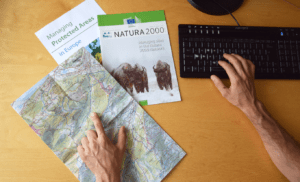
The report has been produced by Propark Foundation for Protected Areas, the project partner responsible for project implementation Action, ‘A.1’, in collaboration with the EUROPARC Federation. This report is a project deliverable of the LIFE Preparatory project LIFE e-Natura 2000.edu (LIFE17PREDE003). The project is funded by LIFE financial instrument of the European Community and implemented by EUROPARC Federation with support of five partners: ProPark, Fungobe/ EUROPARC Spain, TESAF University of Padova, European Landowners Organisation, and the Kullaberg Nature Reserve.
Course I: Applied Conservation Biology
As part of the LIFE e-Natura2000.edu project (LIFEedu for short), a new practical course based on a blended learning approach was available for practitioners in Romania. The course was designed for a core group of 25 selected participants who have a background in biology, ecology or similar. The course was delivered by LIFEedu project partner, Propark Foundation for Protected Areas.
A practical course on applied conservation biology
Biologists have a key role in nature conservation, both on Natura 2000 sites and outside protected areas. The success of conservation depends largely on their competencies, which range from field data collection to the design of conservation measures, to the development, coordination and implementation of programmes and projects, as well as management plans.
Although current education programmes often provide a sound basis for practitioners, often their focus is less on the development of practical skills, perspectives or attitudes which are required in a real-life context. Moreover, the complexity of conservation contexts requires an integrative and multidisciplinary approach. Hence, the need for opportunities for practitioners to complement and update their range of competencies.
The course is designed for people with a background in biology and ecology carrying out practical conservation activities at site level. It focuses on developing and refining the practical skills required by biologists engaged in the management of Natura 2000 sites, throughout the management cycle, on ”how to”. The design of this course is based on IUCN’s Global Register of Competencies for Protected Area Management and adapted to the European and Romanian context.
Through a “blended learning” approach, the course provided a platform for the update and completion of the basic theoretical background knowledge and a framework for a 4 days direct, face-to-face interaction, where real-life situations are analyzed and simulated both in the field and in the lecture room.
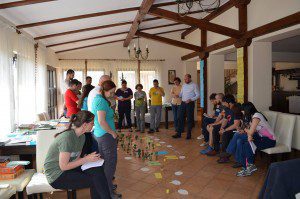
4th Edition of the Protected Area Specialists training © ProPark
Course II: Building alliances for Natura 2000 management
As part of the LIFE e-Natura2000.edu project (LIFEedu for short), a new practical course based on a blended learning approach was available for practitioners in Spain. The course was designed for a core group of 25 selected participants who have responsibilities on Natura 2000 management. The course was led by Fungobe – EUROPARC Spain.
Building alliances for Natura 2000: tools for effective communication, participation and governance
During 7 weeks, 25 Natura 2000 managers from all over Spain -including managers of private lands- discussed and analysed key aspects of stakeholder involvement and good governance in the context of Natura 2000 management.
Course contents included practical and theoretical background on communication and participation in protected areas, and provided different tools for stakeholder engagement. The course drew on the experiences of the participants, who presented and analysed different case studies. Furthermore, each week, participants practiced different personal communication skills, such as presentations, negotiation, group facilitation and conflict resolution.
The course, designed and organised by FUNGOBE as part of the LIFE e-natura2000.edu project had the main objective of raising awareness among Natura 2000 managers of the importance of developing participatory approaches and building relations with the local communities.

Course III: Competent Inclusive Communication
This new blended learning course is designed to help participants understand how to communicate meaningfully and with impact about your Natura 2000 site(s). Working through a series of inter-related topics, step-by-step it increased practical skills and helped participants gain new knowledge important to improve communication competencies.
- Are you an active listener?
- Are you aware of non-verbal communication?
- Are you able to speak authoritatively and assertively, whilst being empathetic to stakeholders?
- Are you comfortable speaking in public?
- Are you confident as a negotiator for your Natura 2000 site’s objectives?
If you answer ‘no’ to any of these questions, or even are not sure what your answer is, then this (e-)learning course “Competent Inclusive Communication” is useful for you!
Aim
The aim of this course was to provide participants with the means to grow the core competencies (skills, knowledge & attitude) that they need to have and be able to do for their Natura 2000 sites. The module’s learning outcomes and practical assignments were designed to give participants tangible products that they can use to communicate about Natura 2000 generally and for their site(s) in particular. By following the module, participants were able to build specific professional and personal capacities required to think strategically and practically about the communication process they need for Natura 2000. They learned how to develop their communication approach, shaped by who is involved, what they can and should do and what tools to use. After attending the course, the participants should be able to:
- Crystalise the purpose of their Natura 2000 communication needs.
- Identify their audience and how to communicate meaningfully with them.
- Define what is special about their Natura 2000 site and why its protection and conservation are important.
- Discover new tools and approaches that engage their audience to be better able to understand their key messages.
- Apply them confidently to build productive relationships.
Working interactively, together with their peers, they learned how to identify key actors important to their protected area, adapt and apply participatory techniques according to their needs and build consensus for shared Natura 2000 goals.
Meet the participants of the Competent Inclusive Communication Course!
Downloads
- pdfLifeEDU_Brochure_online
- pdfLifeEDU_Brochure_onlineDoublepages
- pdfLIFE e-Natura2000edu - Factsheet
- zipLOGOS Life e-Natura2000
- pdfA1 - Technical Report - Identification and assessment of competencies for management of Natura 2000
- pdfLIFEe-Natura2000.edu - 1st Technical Workshop - Natura 2000 Mgt in Romania
- pdfLIFEe-Natura2000.edu - 1st Technical Workshop - Natura 2000 Mgt in Netherlands
- pdfLIFEe-Natura2000.edu - 1st Technical Workshop - Natura 2000 Mgt in Italy
- pdfLIFEe-Natura2000.edu - 1st Technical Workshop - Natura 2000 Mgt in Croatia
- pdfLIFEe-Natura2000.edu - 1st Technical Workshop - Natura 2000 Mgt in Austria
- pdfLIFEe-Natura2000.edu - 1st Technical Workshop - Natura 2000 Mgt in Sweden
- pdfLIFEe-Natura2000.edu - 1st Technical Workshop - Natura 2000 Mgt in Spain
